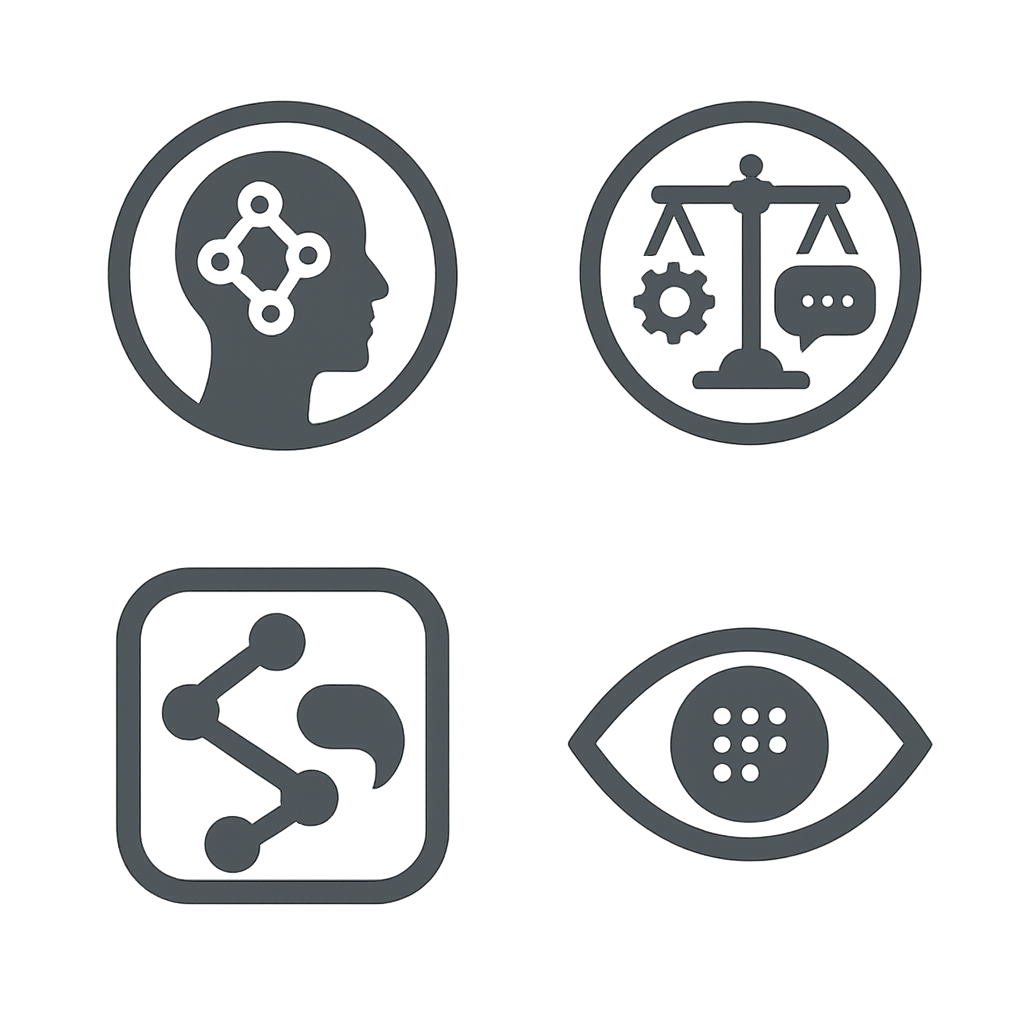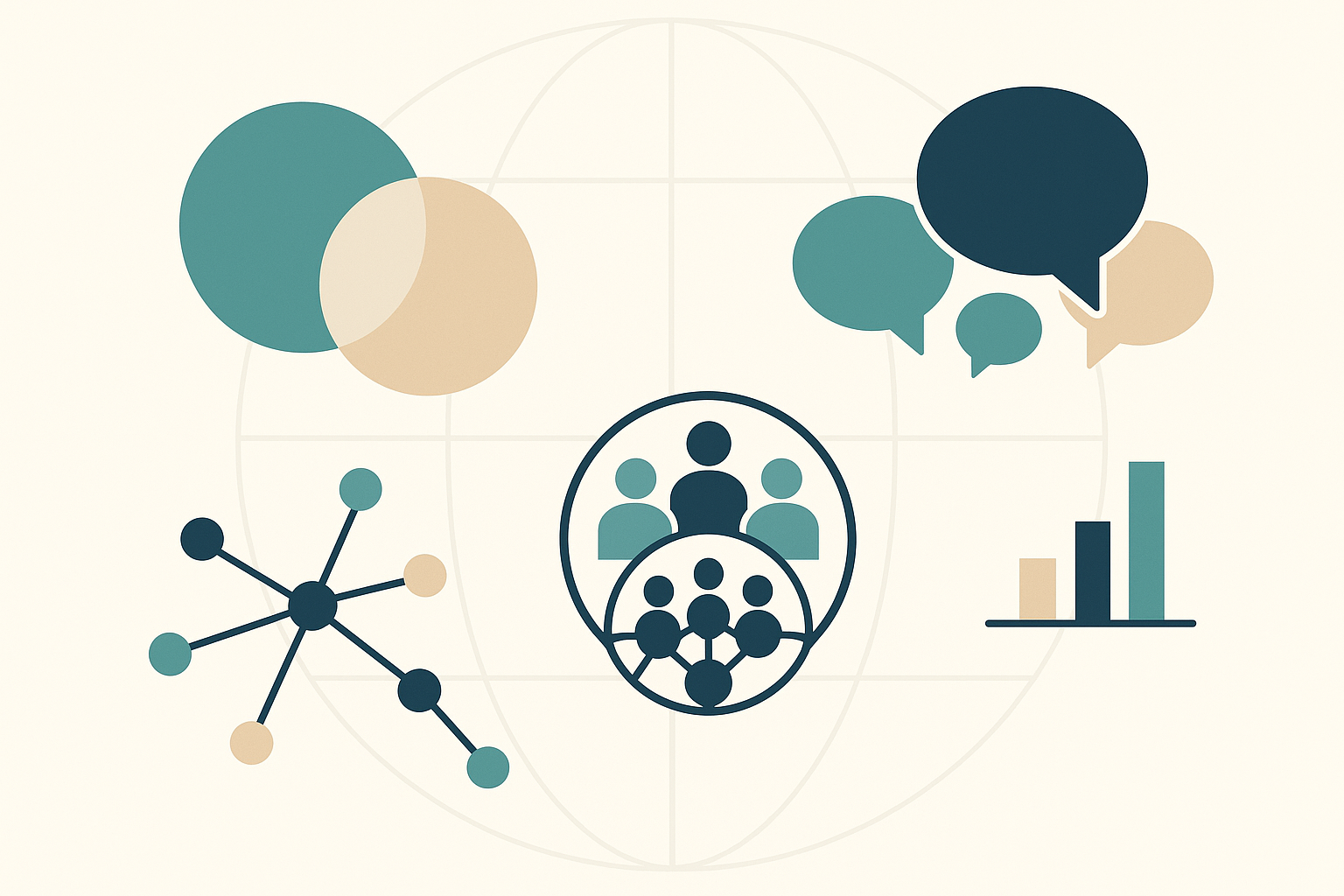A brief not meta-analysis
No claim to completeness
The sociology of AI has coalesced into an identifiable field over roughly the past decade. It asks how AI systems redistribute power, reconfigure work and knowledge, and reproduce (or contest) inequality—treating AI as a sociotechnical phenomenon rather than “just technology.” Recent venue-building (special issues, handbooks in preparation, new institutes) signals maturation: scholars now synthesize findings across health, labor, governance, and culture, and debate methods for studying AI “in the wild.” (SAGE Journals)
A second stabilizing pillar is governance. In Europe, the EU AI Act (with the new EU AI Office) foregrounds risk, transparency, and enforcement; it is already structuring research agendas and civil-society action across the region. (AP News)
Finally, the canon of critical AI studies—from data feminism to surveillance capitalism—anchors classroom syllabi and public debate, while newer work maps environmental and geopolitical costs. (MIT Press Direct)
Note: This blog is co-produced by me (human researcher) and an AI assistant. Drafts, syntheses, and visuals may be machine-generated; interpretation and responsibility remain human.
a) What publications exist?
Foundational/field-shaping books
- Weapons of Math Destruction (O’Neil, 2016). On how opaque models scale inequality. (Penguin Random House)
- Algorithms of Oppression (Noble, 2018). Search, power, and race. (NYU Press)
- Automating Inequality (Eubanks, 2018). Welfare/state analytics and the poor. (SpringerLink)
- The Black Box Society (Pasquale, 2015). Opaque platforms and accountability. (Harvard University Press)
- Data Feminism (D’Ignazio & Klein, 2020). Intersectional frameworks for data/AI. (MIT Press Direct)
- Atlas of AI (Crawford, 2021). AI’s extractive political economy and planetary costs. (Yale University Press)
- The Age of Surveillance Capitalism (Zuboff, 2019). Business models and democratic risk. (Harvard Business School)
Recent field overviews & special collections
- Socius special collection “A Sociology of AI: Inequalities, Power, and Data Justice.” (sagepub.com)
- Sociologica symposium “Generative AI for Social Research.” (sociologica.unibo.it)
- Survey: “AI for social science and social science of AI.” (ScienceDirect)
Core journals frequently publishing on AI & society
- AI & Society (interdisciplinary, culture/communication focus). (SpringerLink)
- Big Data & Society (open access; social-science led). (us.sagepub.com)
b) What websites/resources exist?
- AI Now Institute – research and policy on AI power, labor, regulation; annual landscape reports. (AI Now Institute)
- Ada Lovelace Institute – UK hub ensuring data and AI work for people and society; strategy 2025–28. (adalovelaceinstitute.org)
- Data & Society – independent research institute on the social implications of data/automation. (Data & Society)
- OECD.AI Policy Observatory – comparative dashboards, AI principles, and policy repository. (oecd.ai)
- Oxford Internet Institute – programmes on AI & work, democracy, and governance. (oii.ox.ac.uk)
- Public Data Lab – methods and special issues on generative AI for social research. (Public Data Lab)
- Taylor M. Cruz’s “Sociology of AI & Algorithms” – curated academic resource page. (Taylor M. Cruz, PhD)
- AI & Society (journal home) and Big Data & Society (journal site). (SpringerLink)
c) Which institutions (Germany, Europe, world) have AI in their research field?
Germany
- Weizenbaum-Institut (Berlin) – “research for the networked society”; inequality, participation, governance. (Weizenbaum Institut)
- HIIG — AI & Society Lab (Berlin) – experimental space placing societal issues at the center of AI development. (HIIG)
- AlgorithmWatch (Berlin/Zürich) – civil-society watchdog on algorithmic accountability and AI governance. (AlgorithmWatch)
- TUM Institute for Ethics in AI (Munich) – ethics, governance, and applied frameworks for AI. (Institut für Ethik in KI)
- GESIS (Leibniz Institute) – social-science infrastructure and research on algorithmic impacts. (GESIS)
- bidt (Bavarian Research Institute for Digital Transformation) – think tank linking digitalization/AI and society. (Bayerische Akademie der Wissenschaften)
Europe (beyond Germany)
- Ada Lovelace Institute (UK) – independent institute shaping AI policy for societal benefit. (adalovelaceinstitute.org)
- The Alan Turing Institute — Public Policy Programme (UK) – ethical foundations of AI in government and services. (Turing Institute)
- Oxford Internet Institute (UK) – research on AI’s effects on democracy, work, and everyday life. (oii.ox.ac.uk)
- EU AI Office (European Commission) – implements/enforces the AI Act, especially for general-purpose AI. (Wikipedia)
Worldwide
- AI Now Institute (US) – market power, labor, and regulation analysis. (AI Now Institute)
- Data & Society (US) – long-running research on datafication, automation, and inequality. (Data & Society)
- Stanford HAI (US) – human-centered AI research, education, and the annual AI Index. (Stanford HAI)
- OECD.AI (IGO) – global policy benchmarking and AI principles. (oecd.ai)
- Partnership on AI (international) – multi-stakeholder projects on AI and society. (Partnership on AI)
- Montreal AI Ethics Institute (Canada) – civil-society hub for AI ethics literacy and public engagement. (Montreal AI Ethics Institute)
What this suggests for our blog
We can frame posts around three recurring lenses: power/inequality, work & everyday life, governance & regulation. 2) We should pair conceptual pieces (e.g., “What makes AI social?”) with case-based ethnographies of systems in welfare, health, or education. 3) We’ll keep a living bibliography (books + special issues) and a watchlist of institutions shaping the field—updating as policies (e.g., AI Act milestones) roll out. (AP News)


Schreibe einen Kommentar